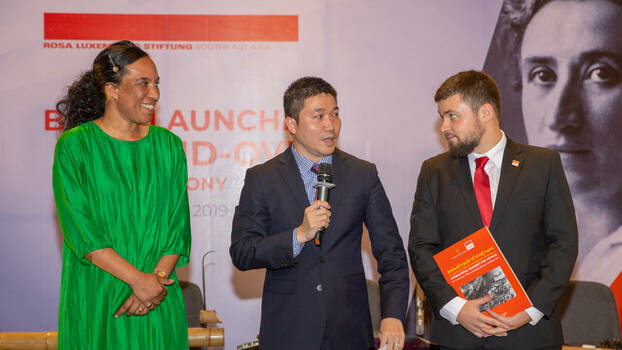
Embracing the mission of assisting the transformation process of Vietnam and its mainland Southeast Asian neighbors to just, sustainable, participatory, and democratic societies, the Rosa-Luxemburg-Stiftung (RLS) opened its Hanoi office in April 2009. For the last ten years, the office—RLS SEA—has operated regionally in Vietnam, Laos, Cambodia, and Myanmar. To mark the occasion, RLS SEA organized an international conference in Hanoi on 13 May 2019 to review its collaborations and refine its approach for the coming program cycles.
Around one hundred participants attended the one-day event, including German delegates and representatives of our wide range of partners including civil society organizations, universities, and members of the National Assembly of Vietnam.
The conference gave an overview of the thematic spectrum in which the office in Hanoi engages. In a panel on social justice, Boris Kanzleiter, Director of the Centre for International Dialogue and Cooperation, outlined the concept of Global Social Rights as a key area of the Rosa-Luxemburg-Stiftung’s international work. They represent the foundation of our efforts to strengthen social and democratic rights for workers, women, peasants, migrants, and other groups regardless of their ethnicity, religion, nationality and legal status. In Southeast Asia this fight materializes in our support for legal trainings, education materials, and advocacy work.
Another important pillar of our work in Southeast Asia are theoretical discussions conducted alongside on-the-ground practices of social-ecological transformation. Southern Vietnam in particular is a region that faces immense challenges related to the global climate crisis. Therefore, our partner organizations are boosting awareness of the need for ecologically sustainable lifestyles and seek to trigger discussions on modes of production allowing energy transition and resource conservation to go hand in hand with workers’ and farmers’ rights.
Accomplishing these endeavors is very much dependent on the quality of the political dialogue within the ASEAN group as well as with other actors holding important roles in the region, like the European Union or China. Phenomena such as the migration of domestic workers within Southeast Asia or the involvement of multinational corporations in the region require active political cooperation to ensure mutual benefits and social protection.
The conference was a platform for reviewing, drawing lessons learned from RLS SEA’s collaboration work in the last ten years, and sharing perspectives on the development of RLS SEA in the years to come. Over the last ten years, in a global context of rising populism and right-wing authoritarianism, RLS SEA joined with local partners (National Assemblies of Laos and Vietnam, local think tanks, grassroots organizations) to increase democratic participation for disadvantaged groups across the region in law-making processes, energy transition, Vietnam’s constitutional reform, the law on association, capacity building for members of National Assemblies, and much more. In addition, RLS SEA’s work also contributed not only to North-South but also South-South exchange processes, especially the National Assemblies of Laos and Vietnam, at the regional and global level. To some extent, its work assisted the internationalization of left-wing actors’ exchange in the region. This is also the direction that speakers in the panel on “Future Perspectives on ASEAN” recommended and RLS SEA also plans to follow.
In the closing speech, our new Regional Director Philip Degenhardt affirmed that RLS SEA will strengthen the space for connecting stakeholders in the region and the world to contribute to a socially just, democratic and ecologically sustainable transition process in the four countries.